- Home
- Roald Dahl
Danny the Champion of the World Page 3
Danny the Champion of the World Read online
Page 3
'Fine, thank you.'
'If you're hungry we could have a midnight feast?' he said.
'Could we, Dad?'
'Of course.'
My father got out the bread-tin and the butter and cheese and started making sandwiches.
'Let me tell you about this phoney pheasant-shooting business,' he said. 'First of all, it is practised only by the rich. Only the very rich can afford to rear pheasants just for the fun of shooting them down when they grow up. These wealthy idiots spend huge sums of money every year buying baby pheasants from pheasant farms and rearing them in pens until they are big enough to be put out into the woods. In the woods, the young birds hang around like flocks of chickens. They are guarded by keepers and fed twice a day on the best corn until they're so fat they can hardly fly. Then beaters are hired who walk through the woods clapping their hands and making as much noise as they can to drive the half-tame pheasants towards the half-baked men and their guns. After that, it's bang bang bang and down they come. Would you like strawberry jam on one of these?'
'Yes, please,' I said. 'One jam and one cheese. But Dad...'
'What?'
'How do you actually catch the pheasants when you're poaching? Do you have a gun hidden away up there?'
'A gun!' he cried, disgusted. 'Real poachers don't shoot pheasants, Danny, didn't you know that? You've only got to fire a cap-pistol up in those woods and the keepers'll be on you.'
'Then how do you do it?'
'Ah,' my father said, and the eyelids drooped over the eyes, veiled and secretive. He spread strawberry jam thickly on a piece of bread, taking his time.
'These things are big secrets,' he said. 'Very big secrets indeed. But I reckon if my father could tell them to me, then maybe I can tell them to you. Would you like me to do that?'
'Yes,' I said. 'Tell me now'
5
The Secret Methods
'All the best ways of poaching pheasants were discovered by my old dad,' my father said. 'My old dad studied poaching the way a scientist studies science.'
My father put my sandwiches on a plate and brought them over to my bunk. I put the plate on my lap and started eating. I was ravenous.
'Do you know my old dad actually used to keep a flock of prime roosters in the back-yard just to practise on,' my father said. 'A rooster is very much like a pheasant, you see. They are equally stupid and they like the same sorts of food. A rooster is tamer, that's all. So whenever my dad thought up a new method of catching pheasants, he tried it out on a rooster first to see if it worked.'
'What are the best ways?' I asked.
My father laid a half-eaten sandwich on the edge of the sink and gazed at me in silence for about twenty seconds.
'Promise you won't tell another soul?'
'I promise.'
'Now here's the thing,' he said. 'Here's the first big secret. Ah, but it's more than a secret, Danny. It's the most important discovery in the whole history of poaching.'
He edged a shade closer to me. His face was pale in the pale yellow glow from the lamp in the ceiling, but his eyes were shining like stars. 'So here it is,' he said, and now suddenly his voice became soft and whispery and very private. 'Pheasants', he whispered, 'are crazy about raisins.'
'Is that the big secret?'
'That's it,' he said. 'It may not sound very much when I say it like that, but believe me it is.'
'Raisins?' I said.
'Just ordinary raisins. It's like a mania with them. You throw a few raisins into a bunch of pheasants and they'll start fighting each other to get at them. My dad discovered that forty years ago just as he discovered these other things I am about to describe to you.'
My father paused and glanced over his shoulder as though to make sure there was nobody at the door of the caravan, listening. 'Method Number One', he said softly, 'is known as The Horse-hair Stopper.'
'The Horse-hair Stopper,' I murmured.
'That's it,' my father said. 'And the reason it's such a brilliant method is that it's completely silent. There's no squawking or flapping around or anything else with The Horse-hair Stopper when the pheasant is caught. And that's mighty important because don't forget, Danny, when you're up in those woods at night and the great trees are spreading their branches high above you like black ghosts, it is so silent you can hear a mouse moving. And somewhere among it all, the keepers are waiting and listening. They're always there, those keepers, standing stony-still against a tree or behind a bush with their guns at the ready'
'What happens with The Horse-hair Stopper?' I asked. 'How does it work?'
'It's very simple,' he said. 'First, you take a few raisins and you soak them in water overnight to make them plump and soft and juicy. Then you get a bit of good stiff horse-hair and you cut it up into half-inch lengths.'
'Horse-hair?' I said. 'Where do you get horse-hair?'
'You pull it out of a horse's tail, of course. That's not difficult as long as you stand to one side when you're doing it so you don't get kicked.'
'Go on,' I said.
'So you cut the horse-hair up into half-inch lengths. Then you push one of these lengths through the middle of a raisin so there's just a tiny bit of horse-hair sticking out on each side. That's all you do. You are now ready to catch a pheasant. If you want to catch more than one, you prepare more raisins. Then, when evening comes, you creep up into the woods, making sure you get there before the pheasants have gone up into the trees to roost. Then you scatter the raisins. And soon, along comes a pheasant and gobbles it up.'
'What happens then?' I asked.
'Here's what my dad discovered,' he said. 'First of all the horse-hair makes the raisin stick in the pheasant's throat. It doesn't hurt him. It simply stays there and tickles. It's rather like having a crumb stuck in your own throat. But after that, believe it or not, the pheasant never moves his feet again! He becomes absolutely rooted to the spot, and there he stands pumping his silly neck up and down just like a piston, and all you've got to do is nip out quickly from the place where you're hiding and pick him up.'
'Is that really true, Dad?'
'I swear it,' my father said. 'Once a pheasant's had The Horse-hair Stopper, you can turn a hosepipe on him and he won't move. It's just one of those unexplainable little things. But it takes a genius to discover it.'
My father paused, and there was a gleam of pride in his eyes as he dwelt for a moment upon the memory of his own dad, the great poaching inventor.
'So that's Method Number One,' he said.
'What's Number Two?' I asked.
'Ah,' he said. 'Number Two's a real beauty. It's a flash of pure brilliance. I can even remember the day it was invented. I was just about the same age as you are now and it was a Sunday morning and my dad comes into the kitchen holding a huge white rooster in his hands. 'I think I've got it,' he says. There's a little smile on his face and a shine of glory in his eyes and he comes in very soft and quick and puts the bird down right in the middle of the kitchen table. 'By golly,' he says, 'I've got a good one this time.'
' 'A good what?' Mum says, looking up from the sink. 'Horace, take that filthy bird off my table.'
'The rooster has a funny little paper hat over its head, like an ice-cream cone upside down, and my dad is pointing to it proudly and saying, "Stroke him. Go on, stroke him. Do anything you like to him. He won't move an inch." The rooster starts scratching away at the paper hat with one of its feet, but the hat seems to be stuck on and it won't come off. "No bird in the world is going to run away once you cover up its eyes," my dad says, and he starts poking the rooster with his finger and pushing it around on the table. The rooster doesn't take the slightest bit of notice. "You can have this one," he says to Mum. "You can have it and wring its neck and dish it up for dinner as a celebration of what I have just invented." And then straight away he takes me by the arm and marches me quickly out of the door and off we go over the fields and up into the big forest the other side of Little Hampden which used to belong to the Duk
e of Buckingham. And in less than two hours we get five lovely fat pheasants with no more trouble than it takes to go out and buy them in a shop.'
My father paused for breath. His eyes were shining bright as they gazed back into the wonderful world of his youth.
'But Dad,' I said, 'how do you get the paper hats over the pheasants' heads?'
'You'd never guess it, Danny'
'Tell me.'
'Listen carefully,' he said, glancing again over his shoulder as though he expected to see a keeper or even the Duke of Buckingham himself at the caravan door. 'Here's how you do it. First of all you dig a little hole in the ground. Then you twist a piece of paper into the shape of a cone and you fit this into the hole, hollow end up, like a cup. Then you smear the inside of the paper cup with glue and drop in a few raisins. At the same time, you lay a trail of raisins along the ground leading up to it. Now, the old pheasant comes pecking along the trail, and when he gets to the hole he pops his head inside to gobble up the raisins and the next thing he knows he's got a paper hat stuck over his eyes and he can't see a thing. Isn't that a fantastic idea, Danny? My dad called it The Sticky Hat:
'Is that the one you used this evening?' I asked.
My father nodded.
'How many did you get, Dad?'
'Well,' he said, looking a bit sheepish. 'Actually I didn't get any. I arrived too late. By the time I got there they were already going up to roost. That shows you how out of practice I am.'
'Was it fun all the same?'
'Marvellous,' he said. 'Absolutely marvellous. Just like the old days.'
He undressed and put on his pyjamas. Then he turned out the lamp in the ceiling and climbed up into his bunk.
'Dad,' I whispered.
'What is it?'
'Have you been doing this often after I've gone to sleep, without me knowing it?'
'No,' he said. 'Tonight was the first time for nine years. When your mother died and I had to look after you by myself, I made a vow to give up poaching until you were old enough to be left alone at nights. But this evening I broke my vow. I had such a tremendous longing to go up into the woods again, I just couldn't stop myself. I'm very sorry I did it.'
'If you ever want to go again, I won't mind,' I said.
'Do you mean that?' he said, his voice rising in excitement. 'Do you really mean it?'
'Yes,' I said. 'So long as you tell me beforehand. You will promise to tell me beforehand if you're going, won't you?'
'You're quite sure you won't mind?'
'Quite sure.'
'Good boy,' he said. 'And we'll have roast pheasant for supper whenever you want it. It's miles better than chicken.'
'And one day, Dad, will you take me with you?'
'Ah,' he said. 'I reckon you're just a bit young to be dodging around up there in the dark. I wouldn't want you to get peppered with buckshot in the backside at your age.'
'Your dad took you at my age,' I said.
There was a short silence.
'We'll see how it goes,' my father said. 'But I'd like to get back into practice before I make any promises, you understand?'
'Yes,' I said.
'I wouldn't want to take you with me until I'm right back in my old form.'
'No,' I said.
'Good-night, Danny. Go to sleep now.'
'Good-night, Dad.'
6
Mr Victor Hazell
The following Friday, while we were having supper in the caravan, my father said, 'If it's all right with you, Danny, I'll be going out again tomorrow night.'
'You mean poaching?'
'Yes.'
'Will it be Hazell's Wood again?'
'It'll always be Hazell's Wood,' he said. 'First because that's where all the pheasants are. And second because I don't like Mr Hazell one little bit and it's a pleasure to poach his birds.'
I must pause here to tell you something about Mr Victor Hazell. He was a brewer of beer and he owned a huge brewery. He was rich beyond words, and his property stretched for miles along either side of the valley. All the land around us belonged to him, everything on both sides of the road, everything except the small patch of ground on which our filling-station stood. That patch belonged to my father. It was a little island in the middle of the vast ocean of Mr Hazell's estate.
Mr Victor Hazell was a roaring snob and he tried desperately to get in with what he believed were the right kind of people. He hunted with the hounds and gave shooting parties and wore fancy waistcoats. Every week-day he drove his enormous silver Rolls-Royce past our filling-station on his way to the brewery. As he flashed by we would sometimes catch a glimpse of the great glistening beery face above the wheel, pink as a ham, all soft and inflamed from drinking too much beer.
'No,' my father said, 'I do not like Mr Victor Hazell one little bit. I haven't forgotten the way he spoke to you last year when he came in for a fill-up.'
I hadn't forgotten it either. Mr Hazell had pulled up alongside the pumps in his glistening gleaming Rolls-Royce and had said to me, 'Fill her up and look sharp about it.' I was eight years old at the time. He didn't get out of the car, he just handed me the key to the cap of the petrol tank and as he did so, he barked out, 'And keep your filthy little hands to yourself, d'you understand?'
I didn't understand at all, so I said, 'What do you mean, sir?'
There was a leather riding-crop on the seat beside him. He picked it up and pointed it at me like a pistol. 'If you make any dirty finger-marks on my paint-work,' he said, 'I'll step right out of this car and give you a good hiding.'
My father was out of the workshop almost before Mr Hazell had finished speaking. He strode up to the window of the car and placed his hands on the sill and leaned in. 'I don't like you speaking to my son like that,' he said. His voice was dangerously soft.
Mr Hazell did not look at him. He sat quite still in the seat of his Rolls-Royce, his tiny piggy eyes staring straight ahead. There was a smug superior little smile around the corners of his mouth.
'You had no reason to threaten him,' my father went on. 'He had done nothing wrong'
Mr Hazell continued to act as though my father wasn't there.
'Next time you threaten someone with a good hiding I suggest you pick on a person your own size,' my father said. 'Like me, for instance.'
Mr Hazell still did not move.
'Now go away, please,' my father said. 'We do not wish to serve you.' He took the key from my hand and tossed it through the window. The Rolls-Royce drove away fast in a cloud of dust.
The very next day, an inspector from the local Department of Health arrived and said he had come to inspect our caravan. 'What do you want to inspect our caravan for?' my father asked.
'To see if it's a fit place for humans to live in,' the man said. 'We don't allow people to live in dirty broken-down shacks these days.'
My father showed him the inside of the caravan which was spotlessly clean as always and as cosy as could be, and in the end the man had to admit there was nothing wrong with it.
Soon after that, another inspector turned up and took a sample of petrol from one of our underground storage tanks. My father explained to me they were checking up to see if we were mixing some of our second-grade petrol in with the first-grade stuff, which is an old dodge practised by crooked filling-station owners. Of course we were not doing this.
Hardly a week went by without some local official dropping in to check up on one thing or another, and there was little doubt, my father said, that the long and powerful arm of Mr Hazell was reaching out behind the scenes and trying to run us off our land.
So, all in all, you can see why it gave my father a certain pleasure to poach Mr Victor Hazell's pheasants.
That night we put the raisins in to soak.
The next day was poaching day and don't think my father didn't know it. From the moment he got out of his bunk in the morning the excitement began to build up inside him. This was a Saturday so I was home from school, and we spent most of the day
in the workshop decarbonizing the cylinders of Mr Pratchett's Austin Seven. It was a great little car, built in 1933, a tiny miracle of a machine that still ran as sweetly as ever though it was now more than forty years old. My father said that these Austin Sevens, better known in their time as Baby Austins, were the first successful mini-cars ever made. Mr Pratchett, who owned a turkey-farm near Aylesbury, was as proud as could be of this one, and he always brought it to us for repair.
Working together, we released the valve springs and drew out the valves. We unscrewed the cylinder-head nuts and lifted off the head itself. Then we began scraping the carbon from the inside of the head and from the tops of the pistons.
'I want to be away by six o'clock,' my father said. 'Then I will get to the wood exactly at twilight.'
'Why at twilight?' I asked.
'Because at twilight everything inside the wood becomes veiled and shady. You can see to move around but it's not easy for someone else to see you. And when danger threatens you can always hide in the shadows which are darker than a wolf's mouth.'
'Why don't you wait till it gets really dark?' I asked. 'Then you wouldn't be seen at all.'
'You wouldn't catch anything if you did that,' he said. 'When night comes on, all the pheasants fly up into the trees to roost. Pheasants are just like other birds. They never sleep on the ground. Twilight', my father added, 'begins about seven-thirty this week. And as it's at least an hour and a half's walk to the wood, I must not leave here later than six o'clock.'
'Are you going to use The Sticky Hat or will it be The Horse-hair Stopper?' I asked.
'Sticky Hat,' he said. 'I'm very fond of Sticky Hat.'
'When will you be back?'
'About ten o'clock,' he said. 'Ten-thirty at the latest. I promise I'll be back by ten-thirty. You're quite sure you don't mind being left alone?'
'Quite sure,' I said. 'But you will be all right, won't you, Dad?'
'Don't you worry about me,' he said, putting his arm round my shoulders and giving me a hug.
'But you said there wasn't a man in your dad's village that didn't get a bit shot up by the keepers sooner or later.'
'Ah,' my father said. 'Yes. I did say that, didn't I? But in those days there were lots more keepers up in the woods than there are now. There were keepers behind almost every tree.'

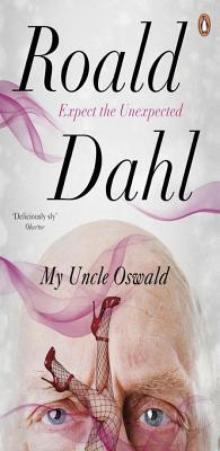 My Uncle Oswald
My Uncle Oswald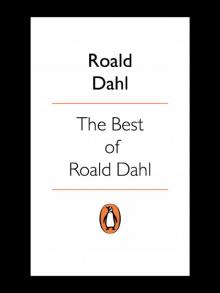 The Best of Roald Dahl
The Best of Roald Dahl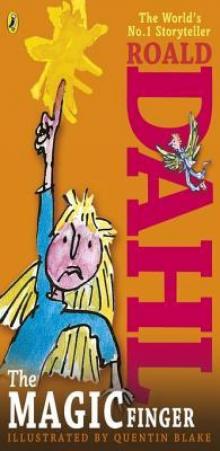 The Magic Finger
The Magic Finger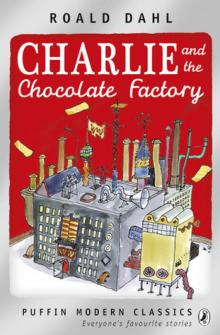 Charlie and the Chocolate Factory
Charlie and the Chocolate Factory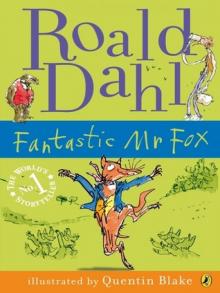 Fantastic Mr Fox
Fantastic Mr Fox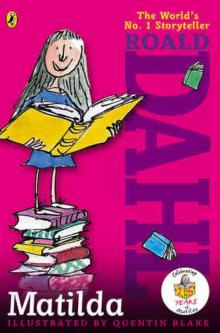 Matilda
Matilda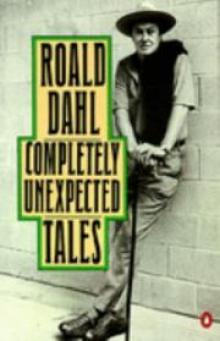 Completely Unexpected Tales: Tales of the Unexpected. More Tales of the Unexpected
Completely Unexpected Tales: Tales of the Unexpected. More Tales of the Unexpected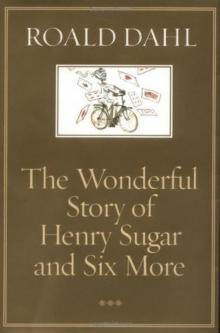 The Wonderful Story of Henry Sugar and Six More
The Wonderful Story of Henry Sugar and Six More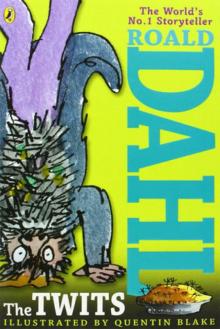 The Twits
The Twits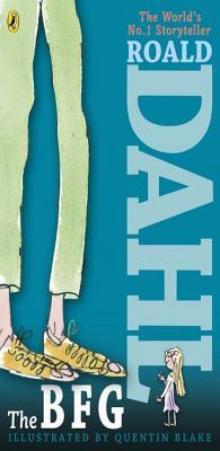 The BFG
The BFG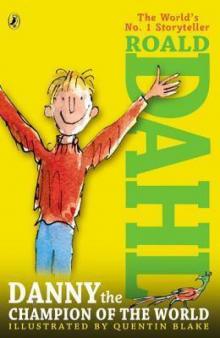 Danny the Champion of the World
Danny the Champion of the World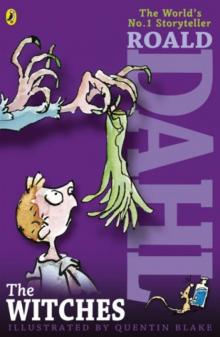 The Witches
The Witches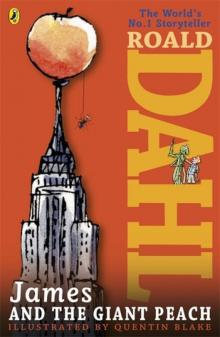 James and the Giant Peach
James and the Giant Peach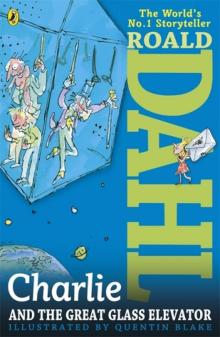 Charlie and the Great Glass Elevator
Charlie and the Great Glass Elevator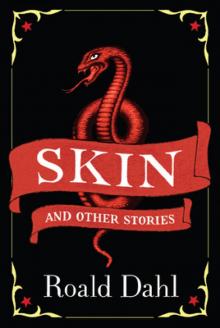 Skin and Other Stories
Skin and Other Stories Kiss Kiss
Kiss Kiss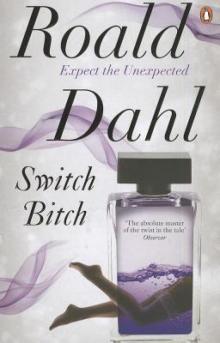 Switch Bitch
Switch Bitch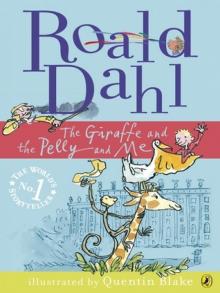 The Giraffe and the Pelly and Me
The Giraffe and the Pelly and Me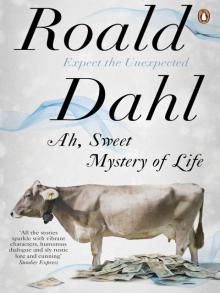 Ah, Sweet Mystery of Life
Ah, Sweet Mystery of Life Fear
Fear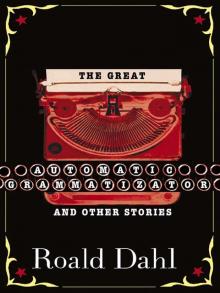 The Great Automatic Grammatizator and Other Stories
The Great Automatic Grammatizator and Other Stories Someone Like You
Someone Like You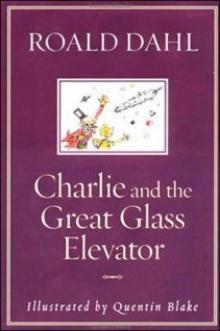 Charlie and the Great Glass Elevator c-2
Charlie and the Great Glass Elevator c-2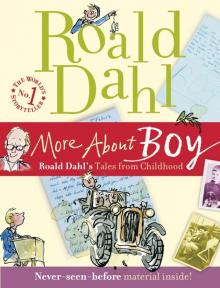 More About Boy
More About Boy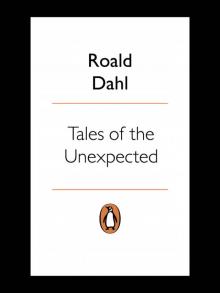 Tales of the Unexpected
Tales of the Unexpected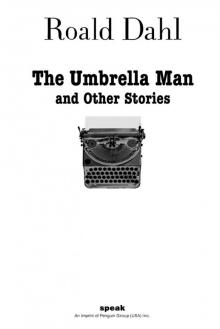 The Umbrella Man and Other Stories
The Umbrella Man and Other Stories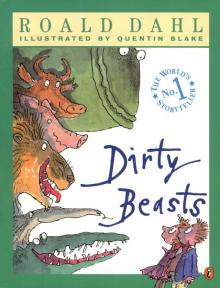 Dirty Beasts
Dirty Beasts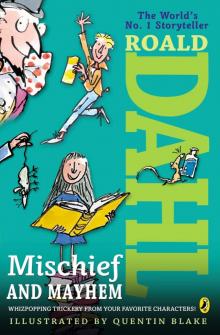 Roald Dahl's Mischief and Mayhem
Roald Dahl's Mischief and Mayhem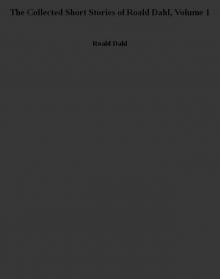 The Collected Short Stories of Roald Dahl, Volume 1
The Collected Short Stories of Roald Dahl, Volume 1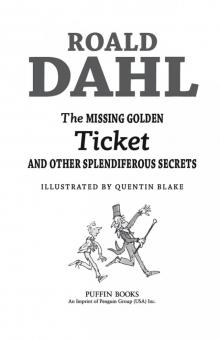 The Missing Golden Ticket and Other Splendiferous Secrets
The Missing Golden Ticket and Other Splendiferous Secrets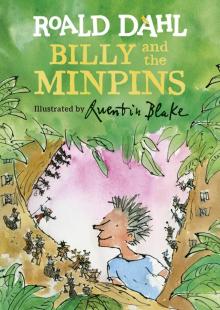 Billy and the Minpins
Billy and the Minpins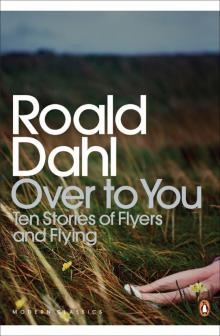 Over to You
Over to You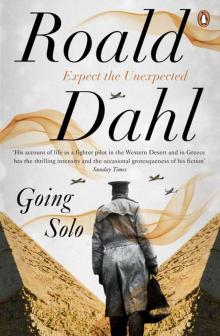 Going Solo
Going Solo Deception
Deception War
War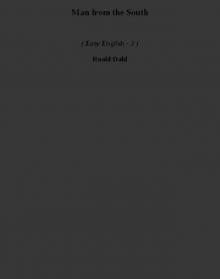 Man from the South ee-3
Man from the South ee-3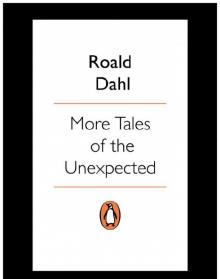 More Tales of the Unexpected
More Tales of the Unexpected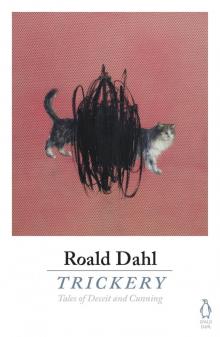 Trickery
Trickery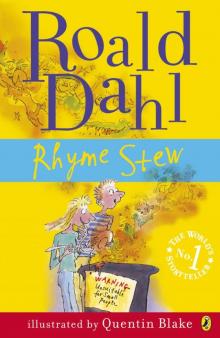 Rhyme Stew
Rhyme Stew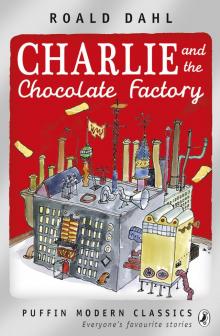 Charlie and the Chocolate Factory (Puffin Modern Classics relaunch)
Charlie and the Chocolate Factory (Puffin Modern Classics relaunch)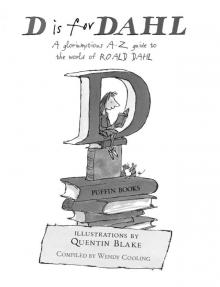 D is for Dahl
D is for Dahl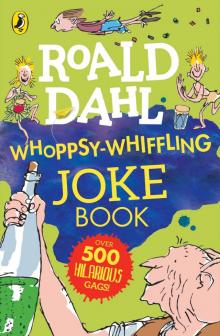 Roald Dahl Whoppsy-Whiffling Joke Book
Roald Dahl Whoppsy-Whiffling Joke Book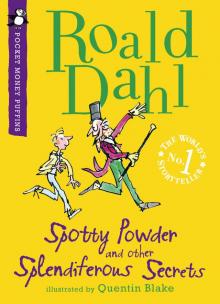 Spotty Powder and other Splendiferous Secrets
Spotty Powder and other Splendiferous Secrets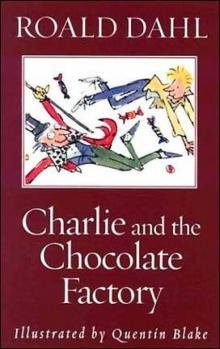 Charlie and the Chocolate Factory c-1
Charlie and the Chocolate Factory c-1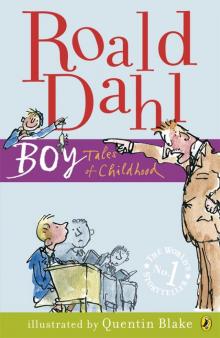 Boy
Boy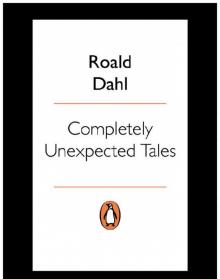 Completely Unexpected Tales
Completely Unexpected Tales Madness
Madness Innocence
Innocence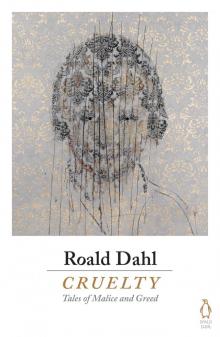 Cruelty
Cruelty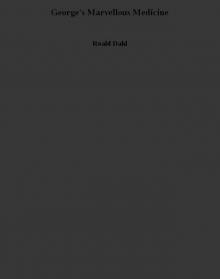 George's Marvellous Medicine
George's Marvellous Medicine